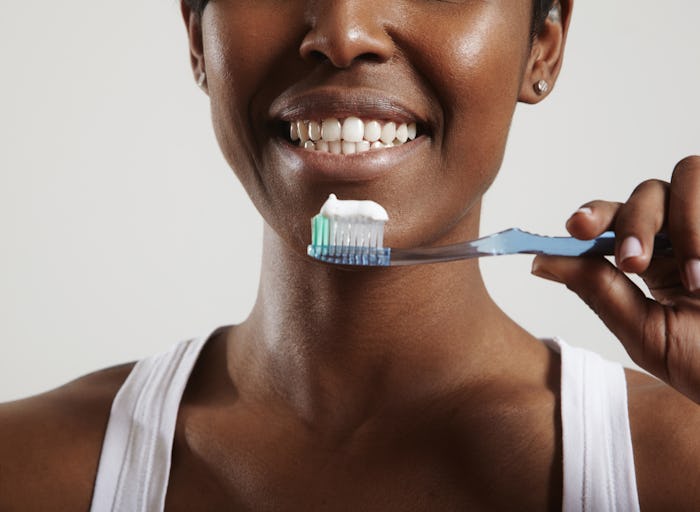Life

7 Nightly Habits To Help You Wake Up With Better Breath
Bad morning breath: it seems almost inevitable, right? You can avoid all the pungent food at dinner and brush your teeth thoroughly before bed, and still wake up with a foul taste in your mouth. But not all hope is lost. You just may need to start implementing some of the unknown things to do at night to wake up without bad breath.
According to Everyday Health, that bad morning breath can be caused by a variety of reasons — the biggest of which is dehydration. "When you sleep, your normal flow of saliva decreases," Sally J. Cram, DDS, a periodontist and a consumer adviser for the American Dental Association, explained to Everyday Health. "That’s why your breath can be worse in the morning."
There are other habits, like smoking, that can also affect your breath in a major way. If, however, you keep a generally clean and healthy lifestyle, then you may be wondering what is going on with your morning breath? At that point, you may want to talk to your doctor, because you may have a more serious underlying health condition that is causing your bad breath, according to Sleep.org. But before making an appointment, try these seven nighttime tips to help you wake up with fresher breath.
1Floss To Get Rid Of Food And Plaque
It turns out this isn't just good for preventing cavities. In an interview with SELF, spokeswoman for the American Dental Association, Dr. Alice Boghosian said that flossing at night helps to remove food and plaque that can cause bad breath to form overnight.
2Stop Snoring And Breathing Through Your Mouth
According to Medical Daily, snoring and breathing through your mouth increases the likelihood of bad breath because you're reducing the amount of saliva in your mouth (since it dries out) and allowing breath-causing bacteria to flourish.
"Any time you reduce saliva in the mouth, you reduce the mouth’s ability to fight the bacteria that causes the bad breath," Dr. Hugh Flax, a cosmetic dentist and past president of the American Academy of Cosmetic Dentistry, told Medical Daily. If you have a snoring issue, trying investing in anti-snore strips or seeking medical attention.
3Brush Your Teeth & Tongue Just Before Bed
According to the aforementioned Everyday Health article, brushing twice a day is crucial to eliminate odor-causing bacteria that accumulate between your teeth and on your tongue. Aim to brush for at least two minutes, brushing your tongue as well, and then go directly to bed afterwards.
4Don't Use Mouthwash Before Going To Sleep
Mouthwash is great to make your breath smell minty fresh in the morning but it can have a harmful effect if you use it just before nighttime. According to Lifehack, using mouthwash can dry out your mouth, which aids in the the bad smell-producing bacteria. Using it at night will only keep your breath fresh for an hour, and then increase the rate at which the bacteria multiplies later on.
5Make Sure You've Had A Full Meal
You probably already know that foods like garlic and onions cause smelly breath and that coffee and alcohol can contribute, but dieting itself can take a toll on your breath, according to Sleep.org. Infrequent eating, like fasting on a cleanse, can fuel bad breath because eating triggers the release of bacteria-sweeping saliva. So if you're not eating, your mouth isn't being cleansed on its own.
6Drink Plenty Of Water Throughout The Day
According to the aforementioned SELF article, one of the key important factors of keeping bad breath away is to stay hydrated. Bad bacteria can spawn when your mouth is dry, which why it is important to promote saliva and stay hydrated by making sure you are drinking plenty of water throughout the day. Keep a water bottle by your bedside in case you get thirsty as you're falling asleep or in the middle of the night.
7Chew Sugarless Gum After Dinner
Another great way to promote saliva and keep bad breath away is to chew sugarless gum, according to the previously mentioned Lifehack article. Not only does gum help loosen excess food and dead cells from the teeth but it also helps to make your breath smell better. Aim for sugarless gum so that it eradicates the downside of having sugar erode your teeth.